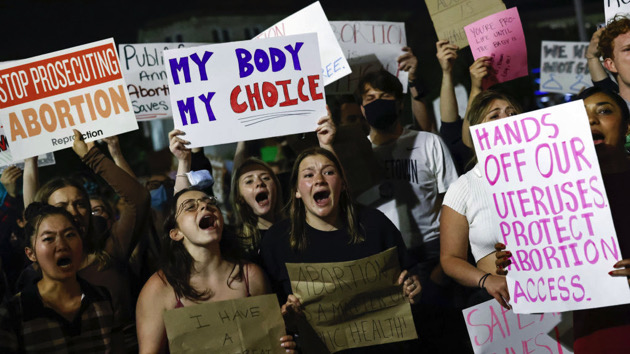
(WASHINGTON) — Amid reports of a draft Supreme Court opinion that would overturn Roe v. Wade, an ABC News/Washington Post poll finds that majorities of Americans support upholding Roe, say abortion should be legal in all or most cases and — by a wide margin — see abortion as a decision to be made by a woman and her doctor, not by lawmakers.
The national survey was completed last week, in advance of a report by Politico Monday night that a proposed first draft of an opinion, apparently by Justice Samuel Alito, called for reversing Roe in a case challenging Mississippi’s ban on abortions after 15 weeks of pregnancy.
See PDF for full results, charts and tables.
In this poll, by contrast, 57% of Americans oppose a ban after 15 weeks; 58% say abortion should be legal in all or most cases; and 54% say the court should uphold Roe, compared with 28% who say the ruling should be overturned.
Support for upholding Roe is 6 percentage points lower than it was in an ABC/Post poll last November. Preference for reversing it is essentially unchanged; instead, more in this survey express no opinion, 18%.
Moving the question outside a legal framework, 7 in 10 say the decision whether or not a woman can have an abortion should be left to the woman and her doctor; this also is down from November, by 5 points. Twenty-four percent instead say abortion should be regulated by law. Even among those who say abortion should be illegal in all or most cases, a substantial share, 41%, also say it should be left to the woman and her doctor.
Trends are not consistent. While support for abortion rights is down slightly in the two items noted above, it’s higher than previously (up 12 points from 2011) “when the woman cannot afford to have a child,” and unchanged in other measures.
Legal or illegal?
Basic views on whether or not abortion should be legal have been more or less stable in polling going back 27 years. The 58% who say it should be legal in all or most cases is very near the average, 56%, in nearly three dozen ABC/Post polls since mid-1995, ranging from 49% to 60%. This includes 26% who now say it should be legal in all cases, exceeding the average, 21%; and 33% who say it should be legal in most cases.
Thirty-seven percent in this poll, produced for ABC News by Langer Research Associates, instead say abortion should be illegal in most cases (21%) or all cases (16%). That’s less than the long-term average, 42%, with a range from 36% to 48%. (Five percent have no opinion on this question.)
Circumstances
Considering specific circumstances, substantial majorities say abortion should be legal when the woman’s physical health is endangered (82%), when the pregnancy was caused by rape or incest (79%) and when there’s evidence of serious birth defects (67%).
The public divides on another circumstance: When the woman cannot afford to have a child, 48% say abortion should be legal, 45% illegal. Support for legal abortion in this case is its highest in six polls dating back to 1996.
On another front, the poll finds most Americans are unaware of new abortion restrictions in their states. In the 22 states that have passed abortion restrictions since 2020, just 30% of residents are aware that this has occurred; more, 44%, think not, with 26% unsure. An open question is how people who favor legal abortion may react if and when they learn their state has taken a different tack.
State laws
Regarding state-level action, 36% say laws on access to abortion in their state should be left as they are now and 33% say access to abortion should be easier than it is now. Fewer, 25%, say abortion access should be harder than it is currently.
Support for greater restrictions is muted, 30%, even in the 26 states that are reported by the Guttmacher Institute as likely to ban legal abortion if Roe v. Wade were overturned. This shrinks to 21% in other states.
Testing two specific restrictions, almost identical numbers say they’d oppose a law in their state making abortions legal only in the first six weeks of pregnancy (58%) or, as mentioned, only in the first 15 weeks (57%); 36% alike support each prospect. At least 12 states have passed six-week bans (most of which have been struck down or blocked by the courts) and five states have passed 15-week bans, with partial passage in a sixth.
Groups
Sixty-two percent of women and 55% of men say abortion should be legal in all or most cases. The gap widens on the shares who say it should be legal in all cases — 33% of women, compared with 19% of men, a wider gap than typical.
Support for legal abortion is highest among liberals (82%), people with no religious preference (80%), Democrats (79%), those with post-graduate degrees (74%) and Northeasterners (72%). It’s lowest among strong conservatives (20%), evangelical Protestants (28%) and Republicans (33%).
As noted, Americans by 54-28% say the Supreme Court should uphold Roe; it’s a similar 51-32% in the states where abortion bans or severe restrictions are anticipated if the ruling were overturned. Among groups, support for overturning Roe reaches a slim majority only among conservatives, 52%. Perhaps surprisingly, support for overturning the precedent reaches only 44% among Republicans and 45% among evangelical Protestants, two of the groups most apt to say abortion should be illegal.
Methodology
This ABC News/Washington Post poll was conducted by landline and cellular telephone April 24-28, 2022, in English and Spanish, among a random national sample of 1,004 adults. Results have a margin of sampling error of 3.5 percentage points, including the design effect. Partisan divisions are 29-25-40%, Democrats-Republicans-independents.
The survey was produced for ABC News by Langer Research Associates, with sampling and data collection by Abt Associates. See details on the survey’s methodology here.
Copyright © 2022, ABC Audio. All rights reserved.
